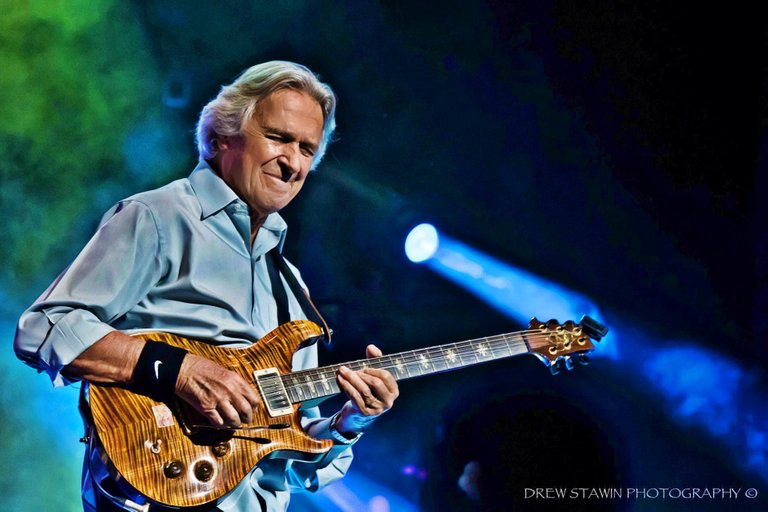
An interview with John McLaughlin. He's one of the world's premier jazz guitarists, with a musical career that spans five decades and as many continents.
"I think mathematicians, scientists, astronomers, astrophysicists, artists, painters, and musicians need to profoundly love what we do. Then in a way, the love makes a connection to that realm where all these idea have always existed and always will exist. I know it sounds like science fiction, but I'm absolutely convinced of this. When I'm truly inspired, then I get access to this realm. How logical is inspiration, how can you classify inspiration in a logical manner? It's impossible, there's no logic to it, it just is what it is." John McLaughlin
Introduction
Improvised music within a sophisticated framework is one if the primary hallmarks of jazz. World class improvisation requires split second reactions, mental agility, dexterity, and the emotive soul of an artist. As a testament to his age defying vitality, on January 29, 2018 at the age of 76, John McLaughlin won a Grammy® Award for the BEST IMPROVISED JAZZ SOLO at the 60th Annual Grammy® Awards. This was his pitch perfect acceptance:
“Winning a Grammy is a wonderful experience, but to win it for improvisation is the jewel in the crown! Thank you!”
Only days after arriving in New York City as a young unknown musician from the UK, John McLaughlin found himself in the studio with Miles Davis who had decided to go electric with his sound. It was this close association with Miles Davis over the years that brought him fame in jazz circles. It was also Miles Davis who eventually nudged him into forming his own band and launching a solo career. The resulting fusion band, the Mahavishnu Orchestra, turned him into a guitar legend in jazz and rock.
It's difficult to fathom the enormous impact John McLaughlin and this band has had on modern music in general and electric guitar in particular. While this was going on, he also delved deeply into Indian music. Later he formed the group “Shakti” with some of the finest musicians in India, a group which fused jazz with Indian classical music. His acoustic guitar tours with The Guitar Trio --Al Di Meola, Paco de Lucía, and John McLaughlin further cemented his reputation as a guitarist. He's been a remarkably prolific artist. Even if he had never released an album on his own, his guest appearances alone would have been enough to constitute a remarkable career.
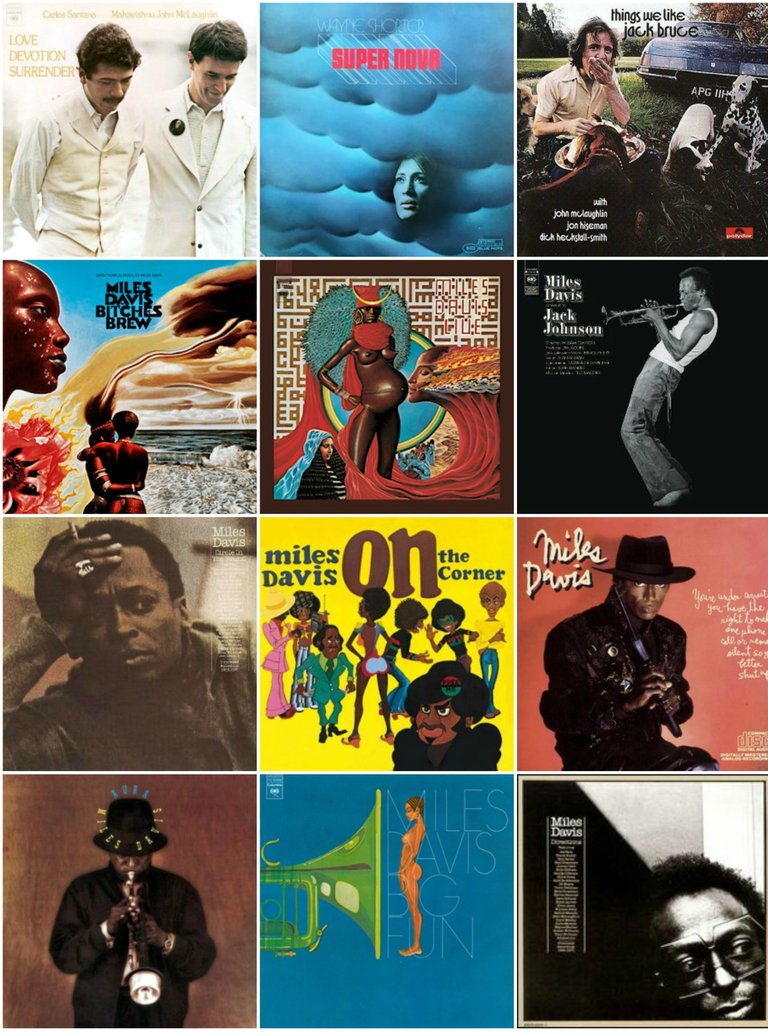
Here are some of his solo albums from the current millennium.
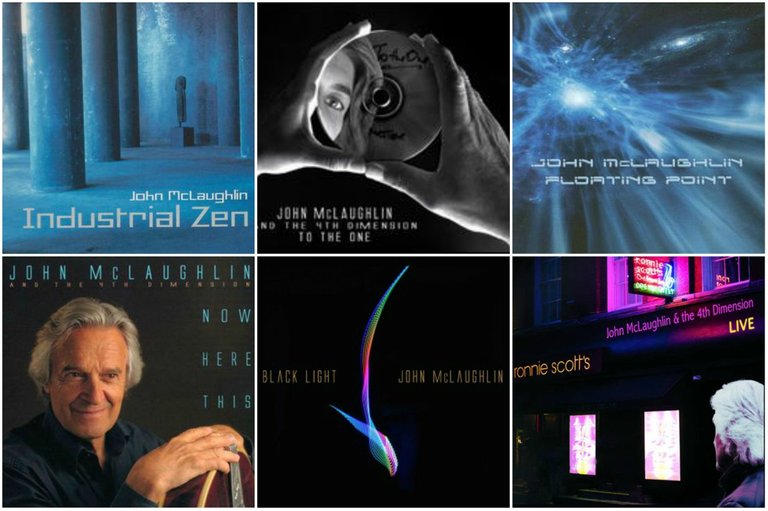
It's been my privilege to interview this living legend on three separate occasions, and this interview is my personal favorite. This was the first audio interview ever to be featured on the front page of the Internet's most popular jazz website, AllAboutJazz, where it remained for two weeks. It did quite well, but it has always gnawed at my conscience that I didn't publish his powerful words for posterity. Thus, I'm particularly happy to now preserve his thoughts here on the blockchain.
This interview took place at the end of August 2015. He was at home getting a little R&R before embarking on a tour of Asia. For musicians of his stature, it is not uncommon for them to set aside a day or days for some press work. PR reps will schedule a series of interviews, and understandably this can be tedious and monotonousness for the artist –- although people at this level are seasoned professionals, generally this isn't a recipe for a great interview.
When he answered the telephone he said he had just finished a lengthy interview which dug deeply into his musical history – I had a sinking feeling, expecting that he would be tired and eager to get the interview over. As you'll read in the interview, it turned out that there was an uncanny synchronicity at work. Here's the first example. Thankfully I had already decided to use the opportunity to explore the magic of music and creativity, and ask about some of the insights he has gleaned during his long and rich musical journey. It turned out to be a serendipitous decision that pushed the right buttons. Unbeknownst to me, the title of his album “Black Light” essentially came about as he pondered such questions, and as a result he was energized and highly engaged throughout our conversation.
The next example, as you'll read in the interview, was the decision to ask him about Dr. Oliver Sacks' book on music and the brain – he had an autographed copy of the book! Moreover, we spoke on a Friday and on Sunday I was stunned to see Oliver Sacks' obituary the New York Times. Finally, during the interview I quoted professor Alan Watts, and John revealed that he had listened to one of his lectures earlier that day on his iphone.
So that's the inside story, I hope you enjoy the interview as much as I did.
Interview
Alan Bryson: First of all congratulations, I saw on Amazon that even though “Black Light” hasn't been officially released yet, you're doing great, it's number one in the Jazz Fusion category.
John McLaughlin: Yeah this is far out! (Laughs) It surprised everybody, believe me.
AB: John before we get started, I thought I would play the opening track on “Black Light” for listeners. This track is called, “Here come the Jiis.”
You can listen to the track here
AB: I have to apologize for not having a fantastic musical vocabulary, but simply as a layperson, what struck me as I listened to “Black Light” is the ingenious rhythmic foundation.
John McLaughlin: Well you know in jazz, whether it's Indian music like Shakti or three guitars, the rhythmical aspect of it is so important. Because it's the rhythm that connects us all together. We are all connected together, this is my personal conviction, my personal experience in a way. We're all connected, and the great thing about rhythm is that it physically brings us together.
A long time ago, going back through the early '70s when I first went to India, I became aware of the expression “God Rhythm.” When the great drummers play and they get truly inspired, it's what they call the “God Rhythm.”
When you hear the “God Rhythm” it's joyful, it's full of joy, and sensuality in a way, and humor – it's filled with everything rich.
So the rhythmical aspect is so important in all my recordings. We're a quartet, and two of the musicians are drummers, and one of them (Gary Husband) also plays keyboards. Depending on the tune, sometimes it's one drummer and one percussionist. So the fact that we have two drummers in the band, that gives you an indication of how important rhythm is to me Alan.
AB: It seems like some of the songs have a slow natural beat to them, but Ranjit and Gary play very fast within that framework, so it creates a kind of tension, because it is a slow beat, but they're playing really fast at the same time. It's like doing two things at once, and you seem to be tapping into the tension, and I think that makes for a very powerful approach.
John McLaughlin: Well you're actually very observant because on a lot of the pieces I set up a slow rhythm for one of the drummers, and I had the other drummer play either a third or a double on top of that. So in effect you have two different waves, the long slow wave underneath, like the ocean, and I really like the effect it has on me as a player. It's very stimulating because you have this wonderful – I don't know how to explain it – this long slow rhythm that's solid yet fluid and supports everything, and then you have this bubbling rhythm on top that's joyful. So you have this freedom to move between slow and middle tempo, and that's very liberating for me as a player.
I'm very impressed you noticed that, because most people simply think there's good drumming going on, which it is, because Ranjit and Gary are really amazing, and of course you must have heard Ranjit singing Konokkol.
AB: Right, right.
John McLaughlin: I'm really happy to get that in, because one of the tunes “Panditji” is an homage to Ravi Shankar. I was very fortunate to have been accepted as a series student by Panditji. I was in New York at that time, and when he would come to New York he would call me and I would go over to his hotel. And one day he said, “John, I'm going to teach you South Indian Konokkol, even though I'm a North Indian musician. What a blessing, and what an impact he had on me, as a human being, and as a musician.
This South Indian theory of Konokkol was really a revolution for me, you can communicate rhythm to each other – there's nothing like hearing someone like Ranjit, who is masterful at Konokkol, singing rhythm.
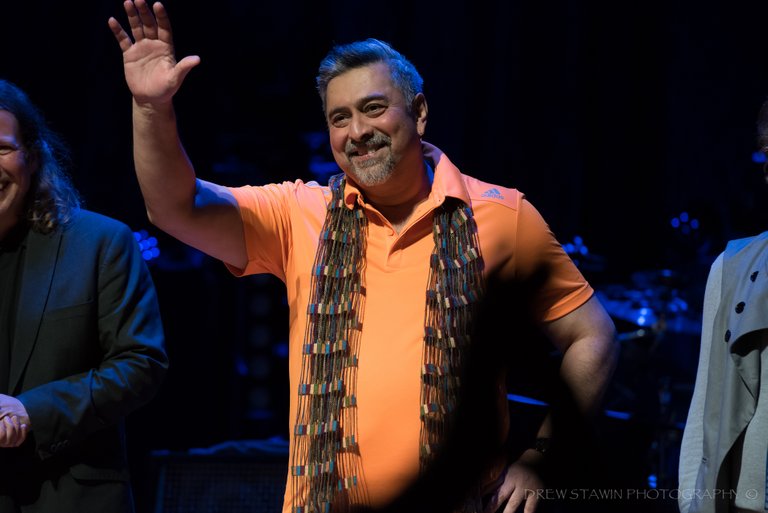
Ranjit Barot
I'm very happy I was able to integrate that into this recording. We've been doing it for a while now on stage. The Konokkol and Gary's rhythm, they do it on the record actually, where Ranjit is singing some rhythmic compositions, and Gary listens to it and plays the same rhythm on the drums. There's wonderful communication between the two of them. I'm really thrilled that we were able to integrate this aspect of music into the album.
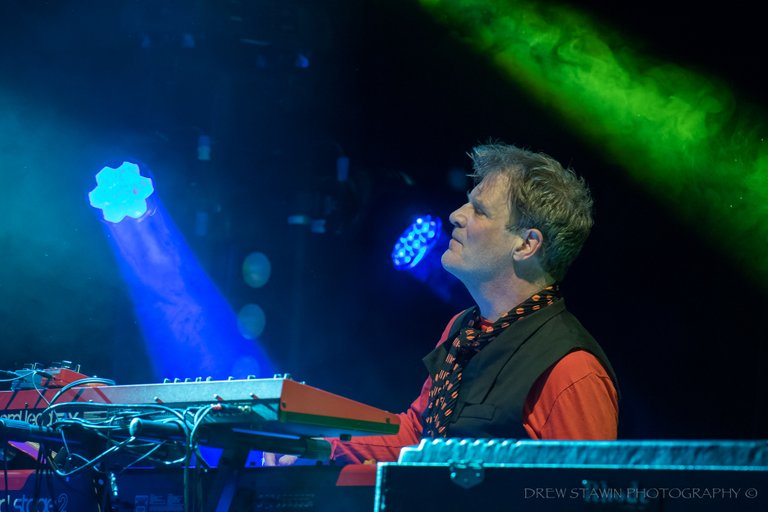
Gary Husband keyboards & drums
AB: John that really comes through, and I thought to myself you guys give fusion a new meaning. The group is so organically bound to each other, it's like a fusion of the musical minds. It really comes through.
John McLaughlin: Oh I'm really happy that you feel that Alan, because we fell it. When I say this is maybe the greatest band I've ever had, I'm not belittling other bands like Shakti or Mahavishnu Orchestra. I mean the first Mahavishnu Orchestra existed for two years. This particular formation with Ranjit, Etienne, and Gary, we've been together for over three years (now 5 and a half.) So when we get together we're just thrilled. Something happens, it's joyful to play together, and this gets into the music. So the music has got a kind of joyous feeling, and it's so marvelous for me to feel that as a player.
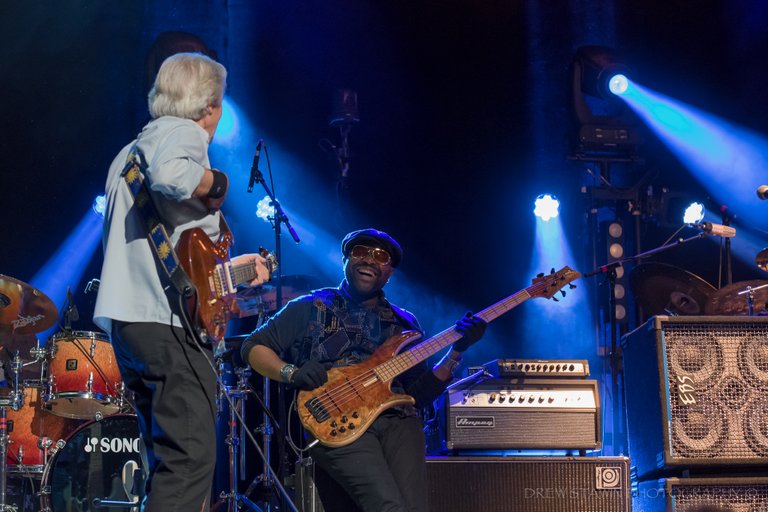
EtienneMbappe
Of course, then to hear it after we've recorded it! Music is about the celebration of life, and the realization that we are all connected, we've been connected, and we can't help but be connected forever, even though we might not be aware of it. What music does, it reminds me in no uncertain terms, just how deeply connected we all are. It's marvelous, this is the power of music for me.
It becomes profoundly spiritual at the same time because these guys aren't just great players, they are also human beings who are participating with that viewpoint. It's not about being religious, I don't mean to bring religion into this, we're talking about the great spirit we're connected to. With this band, on a good night, on a good recording, I feel this sense of wonder for everything and everybody.
AB: It's fascinating that you said that, because there's a couple of questions that relate to that which I wanted to ask you. One is maybe a bit of a metaphysical question, but I notice as someone in the audience when the musicians really connect on stage, it seems like you can also feel the energy of the audience, like we're all connected in this experience too. It's like you can feel what is going on around you, maybe it's just my imagination, but it feels that way. So I wondered if you pick up on that when you are on stage?
John McLaughlin: When I go to a concert and the musicians come on stage, what I want them to do is to sweep me away into their world, to their life story, to their affections, to their joys and sorrows, so that I'm lost in their music. This is everything. If they can do that, that constitutes a great concert for me. It means the music is that good, not just that, but the complicity they have together, the love, affection, and admiration they have for each other, the ability to stimulate each other, to go beyond the normal mind and to to places they've never been before. I know that sounds like Captain Kirk on Star Trek, but it's true. (We both laugh)
So about the audience, I'm part of the audience just like everybody else when I got to a concert, and I'm sure they are all like me. They want to be caught by the music and transported out of themselves and into the musicians' world and into the musicians' music. They find themselves in a greater sense of the word. That's all I ever want when I go to a concert, that I lose myself in their music, and I'm sure most of the audience are looking for the same thing.
Why do we go to a concert, why do we want to see live music? We want that wonderful sense that we all belong together. Music has the power and the beauty to transport us out of our regular little world, and away into the music itself. The whole point of music, of playing, is to find a way to transcend ourselves, our mundane little “world” self, and find a big beautiful world that lies inside all of us. Music, if we're having a good night, you never know Alan, sometimes you have bad nights, you're fighting your own ignorance, your own instrument, but that itself is good. The fight is good. You're not fighting anyone, you're fighting your own ignorance. But then there are nights when we musicians become free, liberated, we're flying in the music. And the audience, they start flying with us, because they're in the music. I know because it happens to me, when the band is flying on stage, I'm flying with them.
AB: That's great, thank you for that answer.
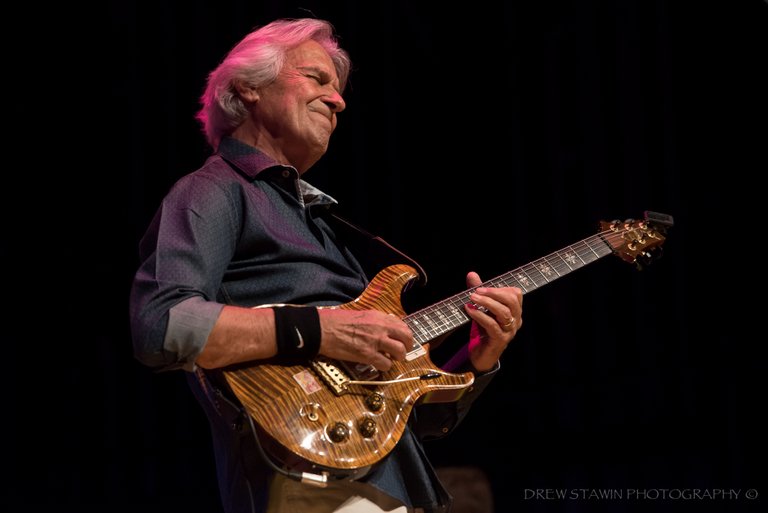
John McLaughlin: (Laughs) I hope it makes sense to you, because it's hard to talk about music isn't it?
AB: Yes it is, and this subject is fascinating. You meet so many people out on tour, so you may know this person already, the neurologist Dr. Oliver Sacks, is he someone you've met?
John McLaughlin: Yes! I know his nephew, I've been in communication with him, and he sent me an autographed book from Oliver. It's fascinating.
AB: Oh great, that's what I wanted to ask you about. I've just started reading it, I'm talking about “Musicophilia” which deals with music and the brain. The really fascinating thing about it for music lovers, is that most of us just accept music as a given. But Dr. Sacks points out in his book that even Charles Darwin was really puzzled by human musicality and he called it a mystery he couldn't explain. He also mentioned the science fiction author Arthur Clarke, he wrote a novel about alien overlords who came to earth, they were super intelligent, but they couldn't experience music, and they couldn't understand why we were moved by it. Although they could, on an intellectual level, see rhythm, harmony, notes, and understand the complexity of music, but they couldn't appreciate it.
Then Dr. Sacks points out that there are a few people who are normal in every way, except that their brain can't process music. If they turn on the radio, it sounds like a horrible noise, like nails on a chalkboard.
So I wanted to ask you your thoughts about where music actually comes from?
John McLaughlin: Well the answer, it's obviously a big mystery. Let me come back to the title of the album, “Black Light.” It's one of the more irrational statements that I've made, because if you're thinking in a logical way, black light is nonsense. But we're irrational beings. We like to be rational sometimes, but art is completely irrational because it doesn't mean anything except what it is. It doesn't refer to anything, yes when we improvise we tell our life story in a capsule, but this is done spontaneously. But black light to me expresses the thought, how am I able to see images in my head where there is no light.
How am I able to hear the music? How does music that I've never heard before, come into my mind? I can hear it, it's music that's never been played. This is new music, and this is what happens when I make a record. How is this possible? How is it possible that I'm hearing new music that is coming into my mind, I hear it and I write it down.
I haven't the faintest idea how it happens! I have no idea, and “why?” is not even a question I can pose. “Why?” doesn't belong in the irrational world, because it's completely irrational. I have no idea how this music comes to me.
I talk to my painter friends, they have no idea. I have one particular friend who paints, he's one of the great wild animal painters in the world. He tells me, “It comes into my head, my mind, I see it in its totality!” I asked him, “How is this possible?” He says, “I have no idea.” What can I answer? I'm confronted with the same mystery every time music comes into my head that I've never heard before. It's inexplicable, it has no logic, it has no reference to anything other than it is what it is.
I mean, I read Oliver Sacks, and I've read another book by an Indian brain surgeon. He is capable of recognizing a musician's brain, physically. That's far out. He says it has different kinds of convolutions between the two hemispheres than a typical brain. He said the thing that happens is that there are lots of synapses that grow between the left and the right hemispheres because of the necessity of discipline, which is logical, married with the completely irrational instinctive spontaneous nonthinking side – the global side and the personal side. He said that he can recognize that, and that really blew my mind too.
So the answer to your question is frankly Alan, I have no idea. It's been a mystery my whole life and here I am, 73 years old and I still don't know. I'm just thankful and amazed every time it happens.
AB: It's an incredible thing. You know John I'm sure you remember when that first synthesizer album came out, it was called “Switched On Bach.”

John McLaughlin: Oh yeah, I remember it very well!
AB: That was a really big thing, and it was interesting because young people were suddenly able to appreciate Bach, and they didn't do anything to it except play it through a synthesizer. I can remember thinking to myself when I heard it, that Bach seems to have tapped into something that must be like a universal law, like mathematics. I don't think mathematicians created math, but they were able to identify the laws of mathematics. There's an elegance to it, and it works. Somehow I wonder, is music simply inherent in the universe, and someone like Bach is particularly adept at drawing upon that universal elegance that is so timeless.
Dr. Oliver Sack's brain scan while listening to J.S. Bach
John McLaughlin: Oh absolutely, and I would have to include Mozart. I absolutely agree with you. I know for a fact that infinite music and infinite ideas, whether they are mathematical, or whether they are art, they exist continuously, and they've existed since the birth of the universe.
I think mathematicians, scientists, astronomers, astrophysicists, artists, painters, and musicians need to profoundly love what we do. Then in a way, the love makes a connection to that realm where all these idea have always existed and always will exist. I know it sounds like science fiction, but I'm absolutely convinced of this. When I'm truly inspired, then I get access to this realm. How logical is inspiration, how can you classify inspiration in a logical manner? It's impossible, there's no logic to it, it just is what it is.
We all experience inspiration in our own way, and we become immediately aware of the new state we're in, when we are in a state of inspiration. It's beyond the normal state of the mind, we're in another state of mind. This other state of consciousness gives us access to places that are inside of us – everything is inside of us in consciousness, I'm convinced of this.
You're talking to an old hippie Alan. I did LSD quite a lot in the '60s, until such time as I realized that everything was in me, and what was important was to learn how to access it, and the only way I can access it, is that I stop taking LSD. Then I started practicing yoga, and then meditation.
AB: It's like what Alan Watts said about psychedelics, once you get the message hang up the phone.
John McLaughlin: There you're talking about one of my heroes. What a wonderful man he was. There are so many lovely people who were around, who are around, and these people have got that inspiration. Whether they put it down in writing, or in lecture – as a matter of fact I was listening to one of Alan Watts lectures today on my iphone!
AB: How about that!
John McLaughlin: Yes how 'bout that. Here's a man who lives in a lovely state of higher consciousness where he's able to articulate with lucidity, with words! -- which is really difficult! Music is a note which cannot be misunderstood, but words can be very easily misunderstood, so we have another kind of access to the mind and the heart. I have such admiration and affection for people like Alan Watts who just through the power of words are able to alter my state of awareness and consciousness. This is marvelous isn't it?
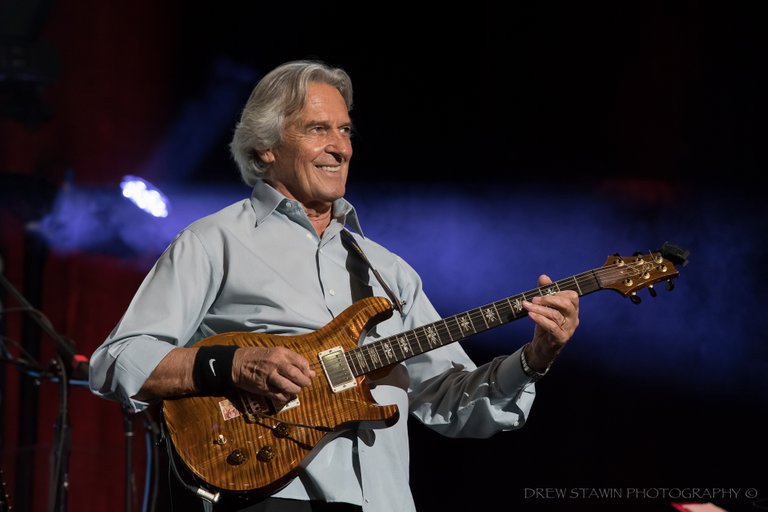
AB: I have to pay homage to musicians, because I think you communicate universally. You go all over the world, in the coming months you're going to be in Bangladesh, Indonesian, Thailand, and people might not be able to speak the same language you do, but you're able to go there and communicate with people.
If I think of a song like the “Gaza City” on this album, you're able convey a feeling without words – that really says a lot, people just need to listen to it and they understand.
John McLaughlin: Yes “Gaza City” you've already made the allusion – I've been to Palestine twice and done two charity concerts, because you can't make any money there. The invasion and bombardment upset me, and still upsets me to this day. We're all connected and whatever I do it has its maxi effect or its infinitesimal effect, that's not my problem. I can only be who I am.
Talking about countries who don't even speak the same language, this is music, and everybody speaks music. Everybody instinctively understands music, the emotions that are expressed in music. They are the fundamental, you scratch any human being and we're all the same. We're all the same, we're all connected, and we always have been. The great thing about music is that people speak it, and they understand it. They may be a little confused in the beginning by a particular form or a particular way, but very quickly they understand.
I think it is a great error to underestimate the capacity of the average audience, or average person to appreciate music on a very profound level. Perhaps some haven't been exposed to profound thoughts, but deep inside they are profound. They just need to be exposed to something that will evoke something in them, whether it be for good or for whatever, but I've been absolutely convinced that music is a power for good, it just brings happiness or joy, or tears, and that's fine too. It's the great unifying power and I'm just delighted to be part of it.
“Lotus Feet” - John McLaughlin & Paco De Lucia 1979
AB: It's such a gift to humanity. Imagine a world without music, it would be so empty.
John McLaughlin: Absolutely, absolutely. That reminds me, on the album there is a little tune for Paco (De Lucia), whom I miss so much. But this particular tune was for a duo album we were to do next year. I had spoken with him just before he passed, we had a number of compositions ready to record, and this was one that he was particularly fond of. So I felt I just had to record this piece, I changed the title to “El Hombre Que Sabia” because we lost him, but he'll live forever in my heart.
The good news is I just finished the mix of a concert that Paco and I did together in 1987 in Montreux, Switzerland. After 28 years I've convinced these people to release it. It's wonderful, from 28 years ago!
AB: Wonderful, when will that come out?
John McLaughlin: It will be out early next year Alan, and I'm really thrilled about it. You know his son Curro has made a film about Paco, I don't know if you've heard about it, but you can probably find it on Amazon, and it's got some great footage on it. I think he missed the very funny side of Paco in the movie, but it was his dad, so maybe he didn't see him the way I did. But Paco was very witty, and very funny, he had a wacky sense of humor. We laughed through so many tours together. So there's some marvelous footage of Paco and his life
Paco de Lucía – The Journey
And there is another song on the “Black Light” album that is a kind of homage, “Here Come the Jiis.” (see link to this song at the beginning of the interview) Ji is an Indian word, like when I'm in India people call me John Ji, it's an expression of respect and affection. That's why you see the title Panditji, that's what I would call Ravi Shankar, I didn't call him Pandit, that's an accolade of greatness, I would call him Panditji.
“Here Come the Jiis” refers directly to Mandolin Srinivas, who died at 45 years of age, dreadful. Every time we would meet, he would come with V. Selvaganesh, who is a percussionist, with whom I did a Konokkol educational DVD, how to master it, which is an indication of how important I consider Konokkol to be. It's actually quite easy once you know how.
Anyway, they both lived in Chennai, in Madras, and would travel together. So every time they would arrive together, it was, “Here come the Jiis!” I couldn't separate the two, but deep down personally it's for Srinivas. We played together for 14 years, so last year was a difficult year for me. So I just wanted you to know where that song came from.
Remember Shakti – Srinivas solos about 3:30 & again at 5:00 into the clip. Pls. watch, he's magnificent
AB: Thank you, that's important information for me. It's so incredible to me that you've been in the music business for 50 years, and you play with such intensity, such energy, and such speed and you maintain this youthful vitality, but I know how difficult and demanding your tour schedule is. How do you do it, what keeps you so youthful and fit?
John McLaughlin: I stay connected Alan, I stay connected. I stay aware of my connection as much as possible, to the great Earth and to every being – I know that sounds kind of hippie and far-fetched, but this is an actual practice that I do daily. (Laughs) I'm still 29 inside, but my body doesn't agree with me sometimes.
AB: But when people see you sitting in a lotus position during an entire concert with Remember Shakti! I remember meeting you after a concert and you were just so full of energy, and you had been riding all night the night before, and you would be riding all night again that night – and I was just amazed how you maintained that level of energy.
John McLaughlin: You know, if you love what you do, I mean yes, you spend a lot of energy playing, but I can tell you quite categorically that I get much more energy from music that I give to music. It might sound strange, but I get so much sustenance from music, and even physical energy. It's quite miraculous really, that is another mystery to me. Yes there's some nights when you haven't slept, and finally you get to the end of the concert and you're dead, that happens too. But frequently I've gone on stage tired and I've come off the stage much more energetic and than I was going on stage. Who can explain this to me? It defies explanation doesn't it.
AB: A couple of days ago Jimmy Herring posted a photo of the two of you together when you joined the Aquarium Rescue Unit on stage, and you both looked so joyous in that photo. So I was just curious if you could share some impressions of Jimmy as a musician and as a person.
John McLaughlin: Do you know Jimmy's playing?
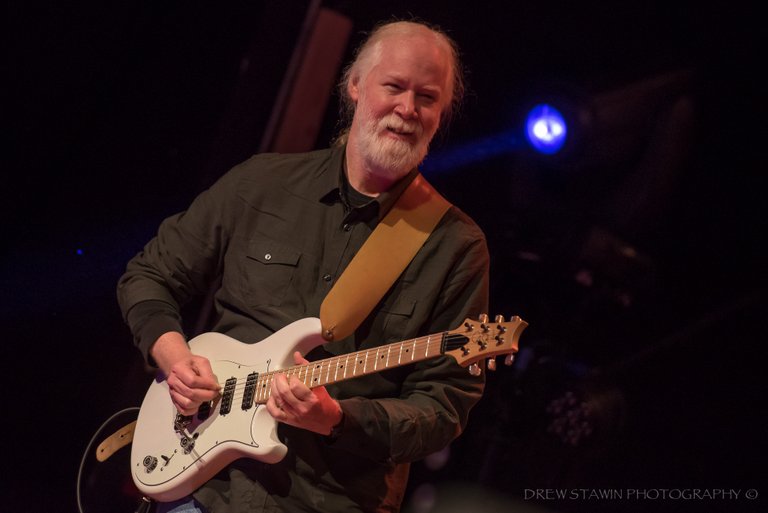
AB: Oh yes, I've interviewed Jimmy a couple of times, he's a great guy and a fantastic player.
John McLaughlin: Wow, not just a great player, but he recorded one of my tunes and he played a solo, and when I heard it I said, “Holy Moly!” (Laughs) I wish I could have played that. He's wonderful, and what a lovely human being, I mean just delightful, delightful. Joyful and I think a completely dedicated musician. His life is completely dedicated to music, and like me, he gets so much back from music.
But you see, musicians can go pretty long, they're not like atheletes. Although at some point it gets physical, and that will be it. I don't know how much longer I will be able to continue, this is the unknown. I'll know it when I'm not able to play anymore, I'll know it and that will be it. Then it will be goodbye, and all I can say is thank you, I've gotten so much from music. I'll never be able to pay that debt.
AB: Well thank you so much for taking the time John to speak with us today.
John McLaughlin: Oh what a pleasure.
AB: Be care when you're out there paragliding, I saw the photo of you paragliding at 73, that's pretty amazing! What was that experience like, was it as good as being on stage?
John McLaughlin: (Laughs) I had to do it once in my life! It was unbelievable, it was such a thrill Alan. Such a thrill. I was in a position where my son was saying, “Come on Dad, you gotta do it! Come on, come on!” So I said okay, if you're gonna do it, I'm gonna do it. And then my son's girlfriend said to my wife, “Come on you gotta do it, you gotta do it!” And in the end all four of us were up there, and it was just out of this world. It was fantastic. You really know what's going on, I'm really impressed.
In any event, next year we'll be in Europe and I do hope I run into you, and if you're anywhere near, please come and say hello will you?
AB: I will John, and it's been great talking to you, and I wish you a super tour and good luck with the album, I'm so glad it started off so great.
John McLaughlin: Thanks so much for the opportunity to speak about it, I do so appreciate it.
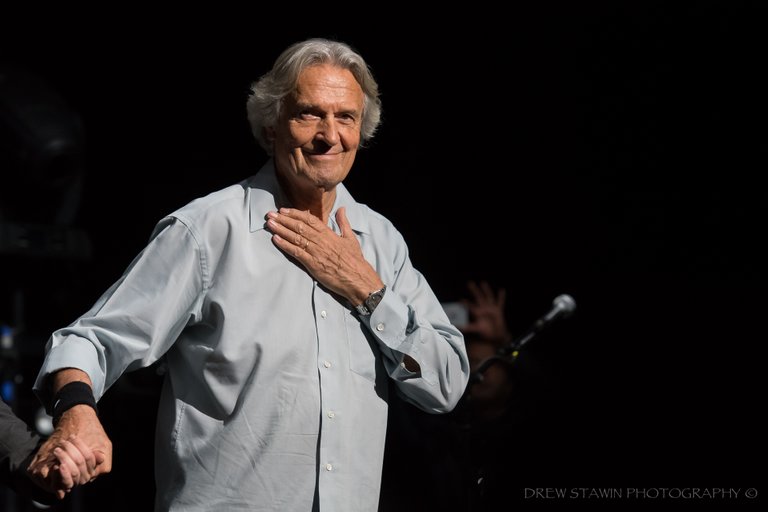
.png)
John McLaughlin is on the label @abstractlogix which is now on Steemit!
Notes
The fantastic photos are by Drew Stawin, please visit him here
"Switched on Bach" is an album cover
Collages of album covers by @roused
Original Steemit interview – made possible by @sndbox
Visit John McLaughlin on Twitter
Lead photo by Drew Stawin with effects by @roused
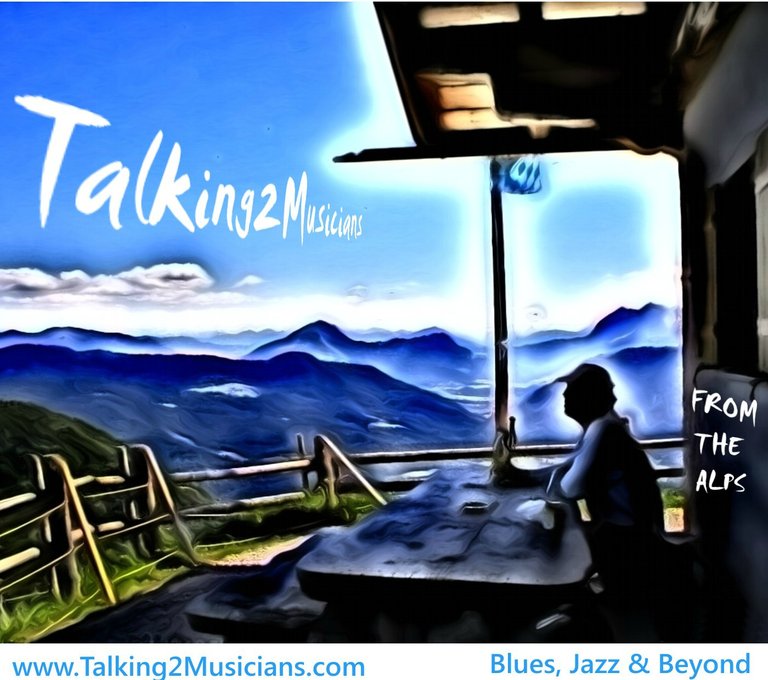

I didnæt get to comment on your Wayne Krantz interview, but I read it and its funny because when he mentions that he couldn't take Frank Zappa seriously as a young man, I was the same with a lot of the HEAVY HIPPIE things. We were punks in our conviction and had a very hard time with all the lofty transcendence-Indian- togetherness. I played jazz with a very motley crew of people and we had this huge hippie daughter who played trompet and flugelhorn. She was always talking about McLaughlin, but we were to macho to really recognise it. I loved Paco since my uncle bought Sólo quiero caminar for me, but McLaughlin always was a bit in the shade in my younger years.
The last ten years I have listened though. Stupid youth :)
Funny that I found this the other day...
P.S. I had a period where I worked with where all the strange images come from, I have had the experience of thing coming to me from outside in all the media I have worked in - music, painting and also in writing.
I understand exactly where you are coming from, in my youth I was a music baby and his fusion was too rich for me to digest. It also took me some time to come around.
I know that clip above and I also enjoyed it. He was so many sides, he put out a album I can recommend for those who like softer music -- it was a tribute to Bill Evans. Here is a song from it.
That's an awesome interview again and you should add the #philosophy tag to it.
You have the skill to meet John on an eye to eye level and let him speak about some very spiritual aspects of his life as a musician. I had to laugh about this quote:
It's awesome, how many of my favorite musicians are connected with the Story of John: Miles Davis, Ravi Shankar, Paco De Lucia...
Thanks again for all the inspiration! I would love to get connected with John via the blockchain ;-)
Ich hatte leider noch keine Zeit dein Interview zu lesen. Ich freue mich aber sehr darauf, denn es verspricht puren Lese- und Musikgenuss! Danke!
Awesome interview 😇and love johns music 😇thanks to your post about 🎶 music 🙏
Oooooh you're bringing back memories. I was really into him as a young teenager!
"Friday Night In San Francisco" is one of the best guitar trio album in music history! Thanks for review!!

Awesome interview ... love Johns music ... as well as his views on life ... real inspiration ... thanks for posting 🙏🙌💝🖖✌️👁
this is so nice beautyfull. i love it. keep it up.
keren sekali
Yes,!!👍you are alright tnx to your post about music! !💝💝💝💝
Congratulations @roused, this post is the fifth most rewarded post (based on pending payouts) in the last 12 hours written by a Superuser account holder (accounts that hold between 1 and 10 Mega Vests). The total number of posts by Superuser account holders during this period was 1638 and the total pending payments to posts in this category was $14192.34. To see the full list of highest paid posts across all accounts categories, click here.
If you do not wish to receive these messages in future, please reply stop to this comment.
nice post ...
if u dont mind can u help to vote my post
@nabilah48
Music is a source of gladness of wise people, she is able to cause good ideas in people, she deeply gets to his consciousness and easily changes dispositions and customs.Your blog pleased me, successes to you and successes, I wish to blow off a large jackpot